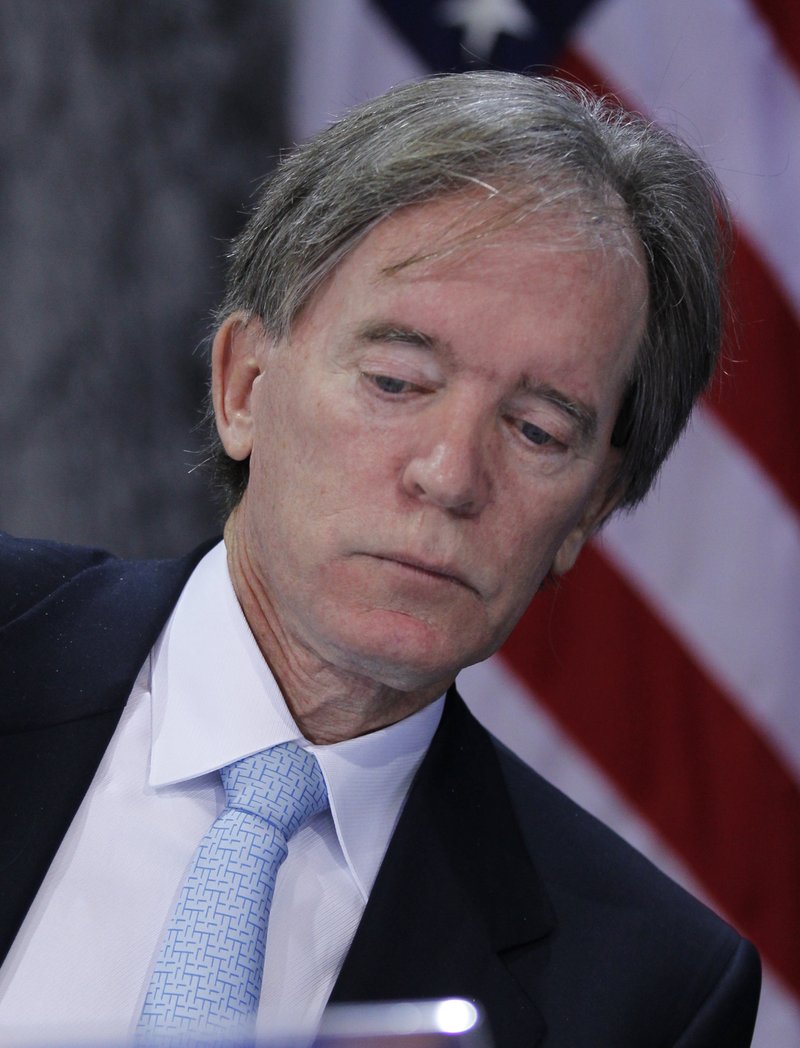DENVER -- William Gross, the famed and colorful bond investor who once controlled the world's largest mutual fund, is closing his professional career of more than 40 years and retiring to focus on managing his personal assets and private charitable foundation.
Gross, 74, was nicknamed the "Bond King" after co-founding the investment firm Pimco in 1971 and delivering returns that were the envy of the fixed-income market. His predictions were closely followed by investors around the world as he made billions of dollars for investors of the Pimco Total Return mutual fund that he ran. But his star dimmed in recent years as his returns fell short of competitors.
Gross left Pimco for Janus in 2014 in a split that surprised investors, one that Gross has described as an internal power struggle. The Janus Henderson Global Unconstrained Bond fund that Gross now runs lost 3.9 percent last year, and it ranks in the bottom 6 percent of all nontraditional bond funds for returns over the past three years, according to Morningstar.
The investment strategy run by Gross has also fallen short of its benchmark, a three-month interest rate known as Libor, since late 2014. Recently, Gross' performance was hurt by trades that would have benefited from weaker prices for German government bonds.
The struggles are a sharp turnaround from earlier in Gross' career. When Morningstar named him its "manager of the decade" for fixed income in 2010, it said Gross made the right calls at the right times and made investors of the Pimco Total Return fund $47 billion wealthier over the previous 10 years.
Besides his strong performance, Gross also gained attention for the colorful commentaries he gave on the market's prospects. In March 2018, for example, he cited everyone from Pol Pot to Moses as he gave his outlook for global financial markets, including a prediction that the yield on the 10-year Treasury would fluctuate around 3 percent for most of the year. It ended up getting as high as 3.26 percent in October before closing 2018 at 2.68 percent.
"Still, in my mind, this is a hibernating global bear bond market, not a beast," he wrote in the commentary. "That may come later, much like our programmable robots that may control future society."
Janus Henderson said Nick Maroutsos, co-head of global bonds, will become portfolio manager of the Global Unconstrained Bond fund, effective Feb. 15. Gross' departure is scheduled for March 1.
"I'm off," Gross said in a statement, "leaving this port for another destination with high hopes, sunny skies and smooth seas!"
For investors, his exit comes as the decades-long bull market in bonds, which fueled his success, is waning and interest rates climb off the post-crisis floor. For the industry, Gross' recent struggles show how hard it's become for individual managers to beat the indexes, algorithms and sprawling trading teams that oversee today's portfolios.
"You don't want to be a soloist, especially not in fixed income," Dan Fuss, who runs a bond fund as vice chairman of Loomis Sayles & Co., said in a phone interview. "That doesn't work, no matter how talented you are."
Influential individuals such as Jeffrey Gundlach of DoubleLine Capital remain, but in his prime, at Pacific Investment Management Co., Gross managed more money than almost anyone, and experts from Wall Street to the Federal Reserve followed him for market cues. As his reputation spread, he became such a frequent business TV guest that Pimco installed a studio in the office.
At Pimco's predecessor, Pacific Mutual Life Insurance Co., which he joined in 1971, Gross was a pioneer in trading bonds -- not to buy and hold, but to deal in pursuit of accumulating returns.
"The total return style of investing was very unusual and it was almost like the market came around to the way he did things," said Morningstar Inc.'s Eric Jacobson.
Gross' last few years at Pimco were a struggle, however, and when he left, the firm made a point of naming a three-member team to replace him as head of the flagship Total Return fund. Gross' switch in 2014 to what became Janus Henderson Group PLC was heralded as a new beginning, but his Global Unconstrained Bond fund, which invested wherever Gross saw opportunity, lagged behind its rivals.
Even Gross conceded he had difficulty.
"Maybe I should have stuck to total return and been more constrained," Gross told Bloomberg TV on Monday.
Gross built a following through newsletters, starting in the 1980s when he wrote a note about Butler Creek, his Ohio boyhood playground. His monthly commentaries drew from a range of inspirations -- cartoon characters like Wile E. Coyote, his son's artificial insemination and his cat Bob.
He issued his final note last March, titled "Killing Each Other," using inhumanity as a metaphor to warn investors about market risks. The letter came out a few weeks before his unconstrained fund suffered a one-day 3 percent loss on a misplaced bet that rates would converge between German and U.S. bond yields.
Gross was a gambler before he became an investor. He taught himself blackjack card counting from the book Beat the Dealer while recovering from a car accident during college. After graduating from Duke University, he turned $200 into $10,000 over four months in Las Vegas, raising the tuition for his MBA at the University of California at Los Angeles.
Information for this article was contributed by John Gittelsohn, Melissa Karsh and Saijel Kishan of Bloomberg News and by The Associated Press.
Business on 02/05/2019
